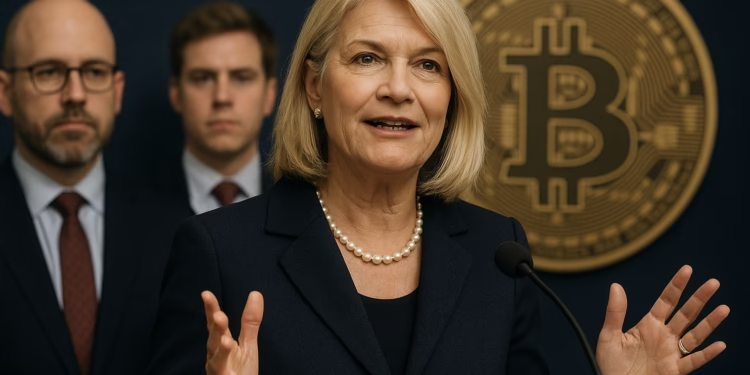Wyoming Senator Cynthia Lummis warned that banks are weaponizing their gatekeeper power to discriminate against cryptocurrency companies, urging federal regulators to quickly finalize open banking rules that would prevent financial institutions from blocking crypto platform access.
The chair of the Senate Banking Subcommittee on Digital Assets told the Consumer Financial Protection Bureau in a Tuesday letter that failing to act would let opponents of digital assets “rewrite the rules in their favor,” citing JPMorgan CEO Jamie Dimon and other bank executives who have publicly opposed crypto adoption.
“Large banks have shown they’ll restrict access for political reasons, targeting industries and individuals they disagree with, including gun manufacturers, digital assets, churches, and even @POTUS,” Lummis tweeted while sharing her letter.
The Wyoming Senator, who chairs the Senate Banking Subcommittee on Digital Assets, said that failing to act on the open banking rule would embolden opponents of digital assets to “rewrite the rules in their favor,” driving innovators overseas and weakening America’s leadership in fintech.
A contested framework.
First proposed in 2022 and finalized under the Biden administration on October 22, 2024, the open banking rule lets consumers securely share financial data with third-party apps through APIs (application programming interfaces). This infrastructure is seen as vital to crypto adoption, bridging traditional banking systems with digital asset platforms.
Without the open banking rule, users could face difficulties linking their bank accounts to crypto exchanges if institutions hostile to digital assets block such connections.
However, not everyone supports the framework. The Bank Policy Institute and Kentucky Bankers Association filed a lawsuit the same day the open banking rule was finalized, claiming it forces data sharing without adequate oversight, increases fraud risks, and unfairly compels banks to open their systems without compensation.
In July, a federal judge paused the lawsuit, granting the CFPB time to reconsider the open banking rule under Section 1033 of the Dodd-Frank Act. The agency later opened a comment period in August, which closed Tuesday.
“There’s no way to connect your existing bank accounts to your preferred digital asset exchanges without the open banking rule,” Lummis wrote. “Many big bank CEOs like Jamie Dimon have made their opposition to digital assets very clear.”
On the same day, several fintech and crypto advocacy groups—including the Blockchain Association and Crypto Council for Innovation—submitted letters backing the open banking rule and reaffirming that “Americans own their financial data, not big banks.”
A “facade” of openness:
Kadan Stadelmann, Chief Technology Officer at Komodo Platform, told Decrypt that if banks retain the power to filter third parties under the open banking rule, they could still block crypto-related data sharing—hindering fiat-to-crypto conversions and destabilizing stablecoin markets.
He argued that the so-called open banking rule has always been “a facade,” describing it as clever marketing that disguises the fact that open banks behave much like traditional institutions.
“Regulation has long been used by an entrenched elite to maintain power,” Stadelmann said, noting that the true concern of major banks is the growing competition from decentralized systems.
While open banking may expose more consumers to scams, Lummis and other crypto advocates insist the open banking rule is necessary to ensure fairness, transparency, and freedom of financial choice in a rapidly evolving economy.











